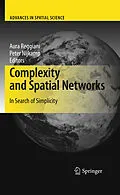This book offers a panoramic view of recent advances in spatial complexity, in order to enhance our understanding of complex spatial networks by simplicity in terms of both the basic driving forces of systemic impacts and the modelling of such systems. Simple models mapping out the evolution of complex networks are undoubtedly a key issue in spatial economic research. In exploring this untrodden ground, this volume pursues new interdisciplinary pathways for theoretical, methodological and empirical analysis in the complex interconnected space-economy. It highlights 'evolutionary' directions and 'unifying' perspectives in this fascinating research field.
Zusammenfassung
Complex systems analysis has become a fascinating topic in modern research on non-linear dynamics, not only in the physical sciences but also in the life sciences and the social sciences. After the era of bifurcation theory, chaos theory, syn- getics, resilience analysis, network dynamics and evolutionary thinking, currently we observe an increasing interest in critical transitions of dynamic real-world systems in many disciplines, such as demography, biology, psychology, economics, earth sciences, geology, seismology, medical sciences, and so on. The relevance of this approach is clearly re?ected in such phenomena as traf?c congestion, ?nancial crisis, ethnic con?icts, eco-system breakdown, health failures, etc. This has prompted a world-wide interest in complex systems. Geographical space is one of the playgrounds for complex dynamics, as is witnessed by population movements, transport ?ows, retail developments, urban expansion, lowland ?ooding and so forth. All such dynamic phenomena have one feature in common: the low predictability of uncertain interrelated events occurring at different interconnected spatio-temporal scale levels and often originating from different disciplinary backgrounds. The study of the associated non-linear (fast and slow) dynamic transition paths calls for a joint research effort of scientists from different disciplines in order to understand the nature, the roots and the con- quences of unexpected or unpredictable changes in complex spatial systems.
Inhalt
Complexity, Evolution, and Simplicity in Space.- Simplicity in Complex Spatial Systems.- The Thermodynamics of the City.- Macro and Micro Dynamics of the City Size Distribution.- A Morphogenetic Perspective on Spatial Complexity.- Algorithmic Complexity and Spatial Simplicity.- Polyplexity.- Evolutionary Networks in a Socio-Economic Context.- Complexity, Evolution and Learning.- Homophily, Conformity, and Noise in the (Co-)Evolution of Complex Social Networks.- Complex Evolution and Learning.- Proximity, Social Capital and the Simon Model of Stochastic Growth.- Evolutionary and Preferential Attachment Models of Demand Growth.- Modelling the Economy as an Evolving Space of Flows.- Empirical Aspects of Network Complexity in the Space-Economy.- Effects of a Simple Mode Choice Model in a Large-Scale Agent-Based Transport Simulation.- Complex, Adaptive Systems, Through Time and Across Space.- Measuring and Visualizing Urban Network Dynamics.- Spatial Autocorrelation in Spatial Interaction.- Complex Networks Analysis of Commuting.- Spatial and Commuting Networks.- Epilogue.- From Complexity to Simplicity.
Titel
Complexity and Spatial Networks
Untertitel
In Search of Simplicity
Autor
Editor
EAN
9783642015540
ISBN
978-3-642-01554-0
Format
E-Book (pdf)
Hersteller
Herausgeber
Genre
Veröffentlichung
14.08.2009
Digitaler Kopierschutz
Wasserzeichen
Dateigrösse
4.63 MB
Anzahl Seiten
284
Jahr
2009
Untertitel
Englisch
Unerwartete Verzögerung
Ups, ein Fehler ist aufgetreten. Bitte versuchen Sie es später noch einmal.
